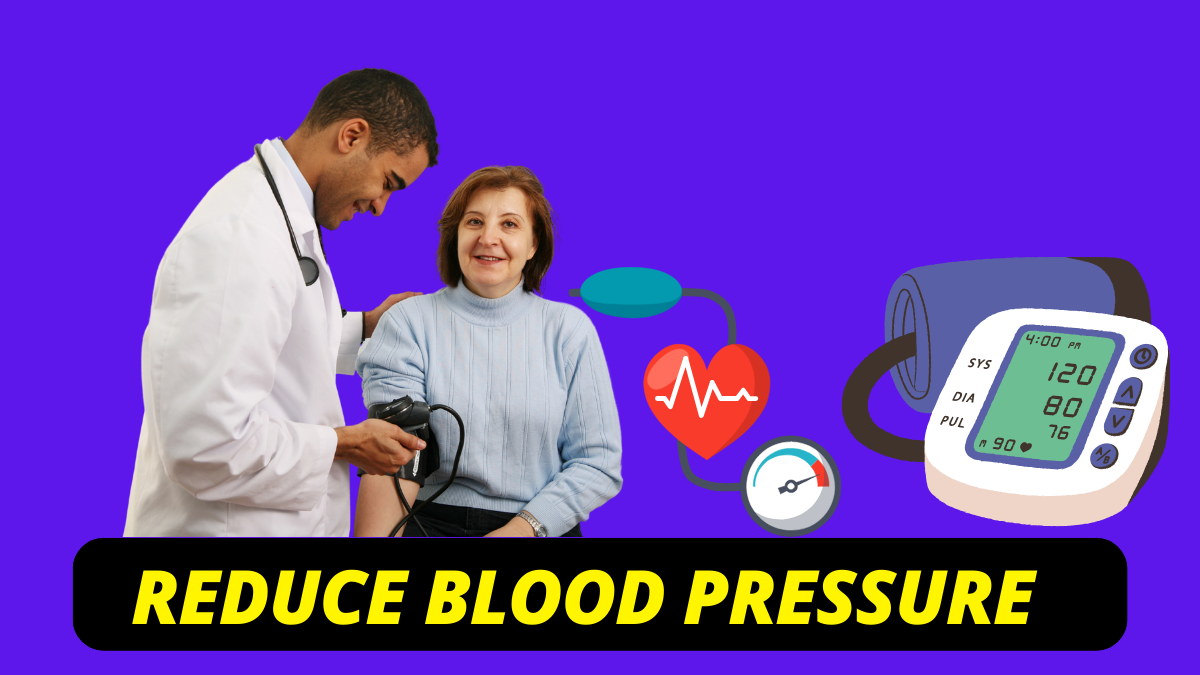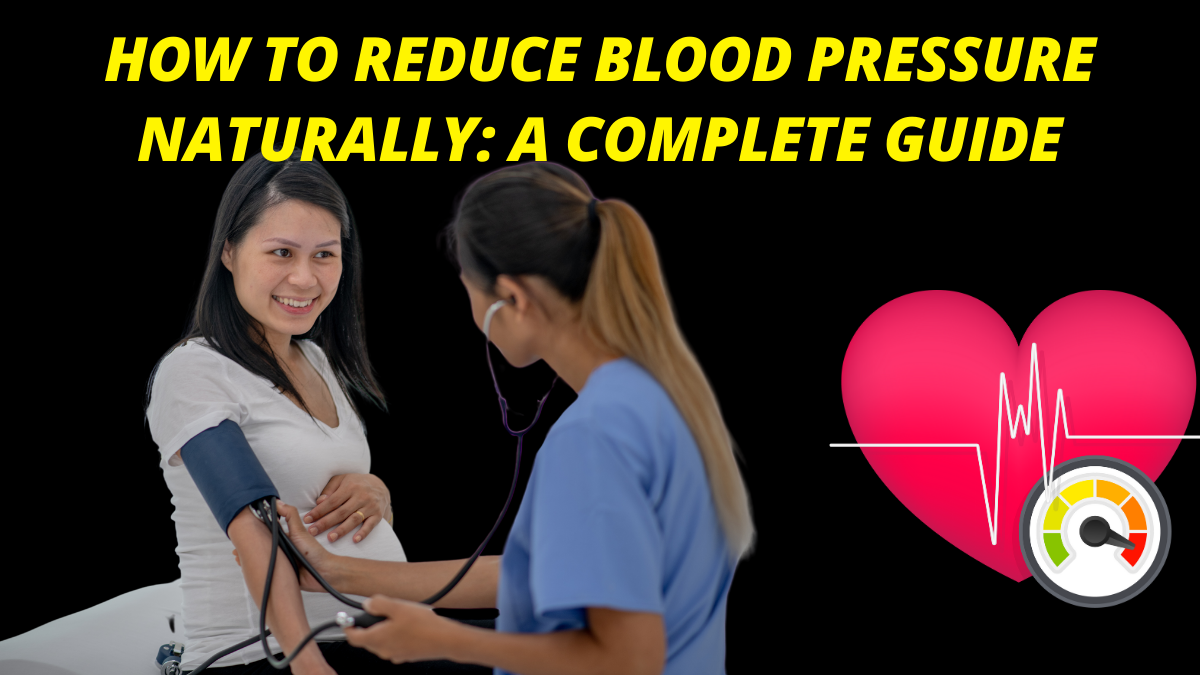Introduction
Hypertension, or high Reduce Blood Pressure, is a severe health problem that affects millions worldwide. Dubbed the “silent killer” because of the absence of symptoms, uncontrolled high blood pressure can lead to heart disease, stroke, and other serious health problems. Fortunately, many effective natural ways reduce blood pressure and improve heart health. This guide will show you lifestyle changes, dietary tips, and daily habits for lowering blood pressure.

Understanding Blood Pressure
Blood Pressure (BP) is a measure of the force that blood exerts against the walls of the arteries as it circulates through the body. It’s a critical indicator of cardiovascular health, providing insights into the efficiency of the heart and the condition of blood vessels. Let’s break down the essential components, causes, and management of Blood Pressure.
Components of Reduce Blood Pressure
Reduce Blood Pressure is measured in millimeters of mercury (mm Hg) and is typically presented as two numbers:
- Systolic Pressure: The top number, which represents the pressure in the arteries when the heart beats (or contracts) and pumps blood.
- Diastolic Pressure: The bottom number, indicates the pressure in the arteries when the heart is at rest between beats.
For instance, a reading of 120/80 mm Hg means a systolic pressure of 120 and a diastolic pressure of 80.
What’s Normal Blood Pressure?
- Normal: Below 120/80 mm Hg
- Elevated: 120-129 systolic and below 80 diastolic
- Hypertension Stage 1: 130-139 systolic or 80-89 diastolic
- Hypertension Stage 2: 140 or higher systolic or 90 or higher diastolic
- Hypertensive Crisis: Higher than 180 systolic and/or higher than 120 diastolic, requiring immediate medical attention.
Why Blood Pressure Matters
High Blood Pressure, or hypertension, often has no symptoms but can lead to serious health issues over time, such as heart disease, stroke, kidney disease, and vision loss. Low Blood Pressure, or hypotension, can also be problematic if it causes dizziness, fainting, or shock due to insufficient blood flow to organs.
Factors Affecting Reduce Blood Pressure
Several factors influence Reduce Blood Pressure, including:
- Age: BP tends to rise with age.
- Genetics: Family history can predispose someone to hypertension.
- Lifestyle: Diet, physical activity, smoking, alcohol, and stress all impact BP.
- Medical Conditions: Conditions like diabetes, obesity, and kidney disease are linked to hypertension.
Managing Reduce Blood Pressure
Maintaining a healthy Blood Pressure involves lifestyle adjustments and sometimes medications. Here are key strategies:
- Balanced Diet: Emphasize fruits, vegetables, whole grains, and lean proteins while reducing salt, sugar, and unhealthy fats.
- Regular Exercise: Aerobic exercises like walking, jogging, or cycling strengthen the heart and improve circulation.
- Weight Management: Maintaining a healthy weight reduces the risk of hypertension.
- Limiting Alcohol and Avoiding Smoking: Alcohol in moderation and quitting smoking can have a significant positive impact.
- Managing Stress: Techniques such as meditation, yoga, and breathing exercises can help lower BP.
Monitoring Blood Pressure
Regular Blood Pressure checks are essential for those at risk of hypertension or those already diagnosed. Home Reduce Blood Pressure monitors make it easier to track and notice trends, allowing for early action if readings are elevated.
Understanding and monitoring Reduce Blood Pressure is a proactive step toward long-term heart and vascular health.
READ MORE: A And J Behavioral Health: Comprehensive Guide to Mental Health and Wellness
When to Seek Medical Help
Signs You Need to Consult a Doctor
While lifestyle changes are effective, there are situations when you should seek medical help. If you notice any of the following signs, consult a healthcare professional immediately:
- Consistently high readings: If your Blood Pressure consistently measures above 140/90 mmHg despite lifestyle adjustments.
- Severe headaches: Intense headaches, especially if accompanied by vision changes or dizziness, could indicate dangerously high blood pressure.
- Chest pain or shortness of breath: These symptoms may be related to high blood pressure affecting your heart or lungs.
- Numbness or weakness: Sudden weakness or numbness, especially on one side of the body, can be a sign of a stroke.
- Blurred vision: High Reduce Blood Pressure can damage the blood vessels in the eyes, leading to vision problems.
Medical Treatments for High Blood Pressure
If lifestyle changes are insufficient, a doctor may recommend medications. Common treatments include:
- Diuretics: To help flush excess sodium from the body
- ACE inhibitors: To relax blood vessels
- Beta-blockers: To slow down the heart rate
- Calcium channel blockers: To relax and widen blood vessels
Conclusion
Lowering your Blood Pressure naturally involves consistent lifestyle changes that promote heart health. Through regular exercise, a balanced diet, and managing stress, you can take significant steps toward maintaining a healthy Blood Pressure. Remember to monitor your blood pressure regularly and seek medical advice if you have concerns.
FAQs
1. Can drinking more water help Reduce Blood Pressure?
Yes, staying hydrated helps maintain proper blood flow, which can support healthy blood pressure.
2. How quickly can I lower my blood pressure naturally?
Natural changes can lead to improvements within weeks to a few months, depending on consistency and individual health factors.
3. Is it safe to lower Reduce Blood Pressure medication?
In many cases, lifestyle changes can effectively lower blood pressure but always consult with a healthcare provider.
4. What foods immediately lower Blood Pressure?
Leafy greens, bananas, beets, and oatmeal can

